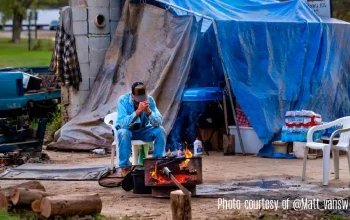Some of the links in this post may contain affiliate links for your convenience. As an Amazon Associate, I may earn a small commission from qualifying purchases without any increase in price to you.
When your safety is on the line, how do you make some of life’s toughest decisions in the moment? Famous survival expert Cody Lundin once said, “Survival sucks!” Why? Because while surviving catastrophes and life-threatening scenarios is tough enough, along with that comes multiple moral and philosophical dilemmas. Let’s examine five types of potential dilemmas that are likely during a disaster or other emergency and how to make informed decision choices beforehand.

I’d venture to say that most people reading this article are here because they want to learn how to be proactive before a crisis arrives. They actively work against normalcy bias in their own thinking.
They also want their actions and decisions to be ethical and moral while still protecting themselves and their families. In a crisis, the decisions we make often affect other people.
For example, if a big rainstorm is coming, you might put sandbags in front of your garage door to prevent your home from flooding. This is a reasonable and legally defensible preparedness technique; your local fire department might even provide you with the filled sandbags.
But the water diverted from flooding your home might instead flood the homes of your less-prepared neighbors. If this has happened before, you might hesitate about “causing” this damage to your neighbor the next time a storm is forecast. It has now become what I call a Preparedness Dilemma.
Preparedness Dilemma 1: How much information should I share with others about my preparedness plans and supplies?
Bottom Line: This is a valid concern. Loose lips sink ships, as they say.
I’m fairly well known in my neighborhood as a preparedness expert, and a few months ago, a neighbor saw me cutting brush in my front yard and waved me over. “Hi Jim, do you know something we don’t know?”
It turns out that my placing several big water tanks on my property and a small solar project were both noticed. I laughed and explained that they were both done to increase capacity and not in response to any particular hazard. But in a long-term power grid interruption, both my stored water and solar equipment could be subject to pilfering by increasingly desperate neighbors.
Do you own a lot of firearms? Don’t share that with other than the most trustworthy friends and neighbors. It doesn’t take a zombie apocalypse scenario to make your guns more valuable than gold. It also may put your collection in danger of confiscation by a tyrannical government, a la Louisiana residents in the wake of Hurricane Katrina.
The Key: Be cautious
This one is simple. How you prepare, what you have on hand, and your plans for any specific event are private and meant only for you and your family or closest group of trusted friends.
Preparedness Dilemma 2: How do I balance preparedness spending with current needs?
Bottom Line: We all think about this. Few have unlimited financial resources.
Ten years ago, would you have thought you could have a compact, 4-week food supply in two buckets that would last 25 years? Today’s technologies have tremendously increased the average family’s ability to prepare for serious disasters without knowing how to can food, operate a ham radio, or have a backyard bunker. The trap is that we now have hundreds of special products, often a bit expensive, that will guarantee your family is much more comfortable in the next doomsday event.
But is your excessive prepping preventing you from paying off credit card debt or your kids from attending summer camp? Balance is very important because it’s easy to spend more than you can afford based on dramatic advertisements or inflated claims of effectiveness.
Maybe this month is not the best financial time to buy a pallet-load of freeze-dried food, but you can buy a little additional canned or shelf-stable food each time you shop for food. Therefore, the children will get to go to camp, and you will get a well-deserved break.
The Key: Prioritize wisely
Be smart when deciding what preparedness or survival supplies to buy. You don’t want to sacrifice today’s quality of life for expensive, more extreme purchases planning for an event that may never happen. Instead, try some of these tips about saving money for prepping supplies.
Preparedness Dilemma 3: How do I decide whether to shelter in place or bug out?
Bottom Line: It depends.
The term “shelter-in-place” is self-explanatory; it means staying where you are, usually at home, but it may also be at a school or business, and riding out whatever is happening. This tactic is most useful in sudden events that make traveling dangerous, such as a chemical spill. One might also decide to shelter in place in an urban situation where snarled traffic would subject you to all kinds of potential hazards.
Here’s a personal example: I vividly remember the crash of Air Florida Flight 90 in January 1982, where the commercial flight hit the 14th Street Bridge in Washington, D.C., during rush hour in the midst of a snowstorm. My stepfather decided to make his way home from his downtown D.C. office via bus and Metro Rail. It was a difficult ordeal that could have been avoided if he had stayed overnight in his office or a hotel and had been prepared to do so with a workplace emergency kit.
Evacuation, also known by the old military term “Bug-out,” is appropriate in some cases but not others. In particular, evacuation before an event like a predicted hurricane is much safer than trying to ride out a Category 5 storm. However, evacuation limits the items you can take; often, you must leave much of your carefully collected preparations behind.
The Key: Have a logical way to make the decision
Whether that is a list of potential disasters and labeling them “Shelter” or “Bug-out,” or a flow chart where one decision leads to another and another, having an established way to decide what is often a stressful or hurried situation will greatly help. This post walks you through creating two types of evacuation plans. Discuss this method with your teenagers and any elderly people who will be accompanying you so they are not confused when the time comes.
Preparedness Dilemma 4: Leaving town during a disaster feels like I’m abandoning family members and close friends.
Bottom Line: You need to resolve this feeling before the next disaster.
Small-town residents have a closer sense of community than our urban and suburban counterparts. Neighbors and workers in local shops are on a first-name basis; people go to each other’s weddings and funerals, and when someone loses their house in a fire, they have support from all over. So, how do you plan to Bug out when necessary, knowing that some won’t be able to do the same?
Have a communication plan with written lists of phone numbers and addresses in case you lose or break your phone, so you can stay in touch with as many of your friends and neighbors who stay behind as possible. Be ready to relay information to them on weather forecasts and how to access emergency aid.
The Key: Address these feelings now
Talk it out with people you trust, whether clergy members, counselors, or barbers. The point is you need someone with common sense, a third party, to validate that you’re not abandoning the entire town by taking care of your family. You can’t save everyone, and family comes first.
Preparedness Dilemma 5: Should I be concerned about and be ready for potential looting?
Bottom Line: The danger of looting is an important, valid concern.
We learned from big disasters like Hurricane Katrina or the Minneapolis-St. Paul riots in 2020 that looting is a valid concern, and many think they might feel better by having firearms as part of their preparedness planning. Americans have an almost 250-year tradition of owning guns for self-defense. But there are definite legal and moral issues if you injure or kill someone, and safe use of firearms requires training and practice.
Criminals tend to look for easy targets, with low risk to their safety. Make sure you have visible barriers, such as fences or security screen doors that the casual looter can see is going to take serious work to breach. Alarm signs can’t hurt, but depending upon the level of chaos and scarcity of law enforcement nearby, the looter may not care if your alarm sounds. All of these preparations, especially if added together, may significantly reduce your need actually to defend your home.
There are non-lethal alternatives to guns, which can increase the safety of those for whom firearms use, even in self-defense, is against their beliefs. Chemical agents such as “pepper spray” or even “bear spray” inflict pain and can make breathing difficult for those on which it’s used, but the effects are temporary and meant to be a distraction. The use of chemical agents really only buys you time. While the person is incapacitated by their pain, you can use this time to escape or to take other measures to control the person. The looter may be inclined to go elsewhere to find an easier victim.
The Key: Decide in advance your self-defense method and plan for it
However, you plan to protect yourself and your property, research local, state, and federal laws, and be prepared to deal with the aftermath. Eventually, law and order will be restored, and you want to be on the right side of the law if at all possible.
FAQ
In many cases, yes. Bear spray is simply repackaged pepper spray designed to cause temporary pain to deter an attack by a bear or other large animal. The best way to find out the local laws regarding defending yourself against a criminal attack with bear spray is to talk to your local police or sheriff’s department.
Begin by reading this post to create a threat assessment. It contains links to additional articles related to the threats you’ve determined are the highest priority to prepare for. Make a list of things you’ll need from these and other sources, and prioritize them from the most important to the least. Budget a monthly amount you can set aside for prepping, and work your way down the list. You may have to trade off another routine expense, like eating out or buying a coffee a few times a week, but you’ll feel much better in a few months as you make your way down the list.
Two things are important to ensure you can handle your firearm safely and protect yourself financially. First and most importantly, you need training from a professional. Your local law enforcement agency may provide training to the public or can at least refer you to a local instructor. Firing ranges usually offer safety and basic gun-handling skills courses as well. Any training you can get will increase your confidence and help you protect your family.
The other important aspect of self-defense with a firearm is the potential for the criminal or their next-of-kin to civilly sue you following a shooting. Even if law enforcement agrees that you lawfully defended yourself, a civil jury can hold you financially responsible. Talk to your insurance agent about self-defense liability insurance; it’s not terribly expensive and usually includes legal representation if you are sued.
Related Prepping Dilemmas Content

Final Thoughts
Preparing for any type of emergency or worst-case scenario is as much a mental exercise as a physical one. You are planning for times that are, by definition, uncontrolled and often unpredictable. Professionals of all kinds often use mental rehearsal, closing their eyes and imagining a situation, working their way through a successful conclusion to the problem. I know it works because I have used it for years. Prepare to resolve your potential dilemmas by planning and rehearsing how you will overcome them, not only by yourself but with family, friends, and co-workers.






